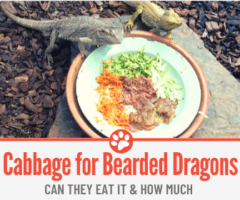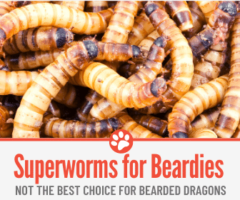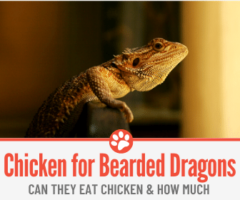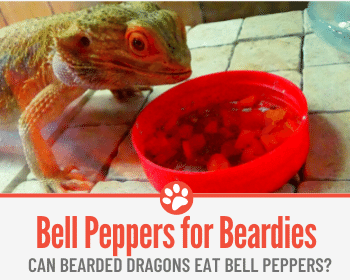 We’re about to enter into the prime season for bell peppers, and so I started to wonder whether bell peppers are a suitable food to feed to bearded dragons?
We’re about to enter into the prime season for bell peppers, and so I started to wonder whether bell peppers are a suitable food to feed to bearded dragons?
In this guide you will learn which bell Peppers are safe for your Beardie, how to prepare and feed them to your Bearded Dragon!
Can Bearded Dragons eat Bell Peppers?
Yes, bearded dragons can eat bell peppers. Bearded dragons are omnivores (they eat both animals and vegetation). Bearded dragons are commonly regarded as being scavengers. Bearded dragons will generally eat anything that they can find, but there are some more particular members of the species, however, who will not always accept the food.
What kind of peppers can bearded dragons eat
Bearded dragons can eat bell peppers, but they should not eat just any type of pepper. Other types of pepper are generally much hotter than bell peppers.
Hotter peppers, whilst unlikely to cause any negative impact to the bearded dragon, are unlikely to be to their taste, and this may deter them from eating the remainder of their food, if the peppers are mixed in.
Bearded dragons need to eat to be able to maintain a healthy weight, body temperature and to continue to grow and flourish. It is therefore recommended that bearded dragons are only fed bell peppers rather than hotter varieties of peppers.
Bell peppers of the red or yellow variety tend to be more popular amongst bearded dragons because of the sweeter taste, but this is not the case for all bearded dragons.
Sweet bell pepper
All bell peppers are considered to be sweet in comparison to other types of peppers. Wilbur Scoville invented the Scoville scale during 1912, and the Scoville scale is used to measure the “spiciness” or “heat of peppers.
Bell pepper generally have a very low grade on the Scoville scale, the reason for this is that bell peppers are sweet is that they possess a recessive trait that prevents the production of capsaicin, this is the chemical that gives other peppers their heat.
Mini sweet peppers
Bearded dragons can eat mini sweet peppers as well as the larger bell pepper variety. Bell peppers can be fed to bearded dragons, in moderation. Still, their diet shouldn’t be overloaded with these foods because while they provide high levels of Vitamin A and Vitamin C, they are low in other minerals such as calcium.
Calcium is essential for a healthy diet and therefore bearded dragons should enjoy bell pepper and sweet mini peppers as part of a balanced diet.
Red bell peppers
Bell peppers obtain their red colour from the fact that they are fully ripened, and they, therefore, have a sweeter, fruitier flavour. Bearded dragons generally tend to prefer the sweeter peppers. The peppers are sweeter as the level of capsaicin is lower.
Red bell peppers are usually higher in Vitamin C than their green and yellow cousins. Vitamin C is essential to a bearded dragons’ diet, this is discussed further below.
The red peppers are also higher in beta-carotene, this yellow or orange pigment not only gives the red bell pepper its colour but also gives them high antioxidant properties. Foods that are high in this antioxidant are generally very high in Vitamin A.
Vitamin A is a crucial element to the bearded dragons’ diet, and it helps the bearded dragons’ bodies to develop defences against illness and infection, allowing the animals to see in dim light and keeps their skin healthy. While some vitamins can be supplemented artificially, Vitamin A should not be supplemented in this way because Vitamin A in high doses can be fatal for bearded dragons.
The recommendation is, therefore, to provide foods that are high in beta-carotene, as part of a balanced diet. Other foods that are rich in beta-carotene include any brightly coloured orange and yellow vegetables and dark green vegetables such as broccoli, spinach.
Green bell peppers
Green peppers are a popular food choice for bearded dragons, and some bearded dragons will prefer the less sweet taste of the green bell pepper. Green peppers are significantly less sweet than red and yellow peppers, and therefore some bearded dragons will only eat the green peppers.
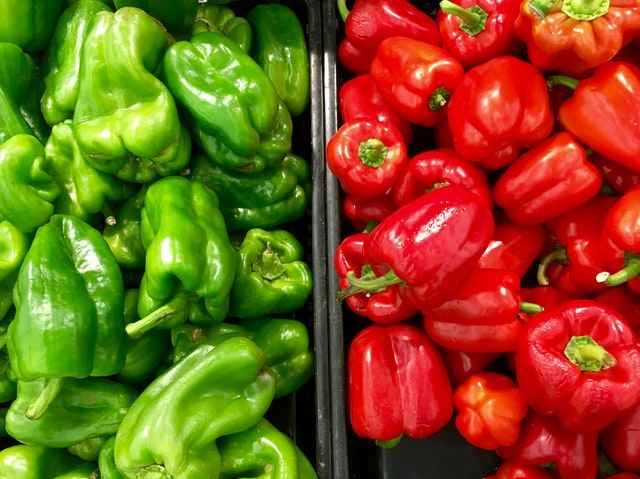
How to prepare bell peppers for bearded dragons.
In order to prepare the bell peppers for the bearded dragons to eat, it is recommended that you cut the bell peppers into very small pieces. Firstly, remove the seeds and dependent on the age of your bearded dragon, you may want to remove the waxy skin from the pepper as this may make the pepper easier to chew and digest.
Bearded dragons are omnivorous, and therefore their diet should be 50 per cent meat and 50 per cent vegetables. You should avoid light green vegetables which whilst rich in fibre and water with limited nutrient value as these do not provide bearded dragons with the nutrients they need.
What are the essential minerals and vitamins that bearded dragons need?
Bearded dragons need a diet that is rich in both meat and vegetables. Owners of bearded dragons need to ensure that they manage these creatures’ diets correctly. For younger dragons, their diet can be made up of 50 per cent meat and 50 per cent vegetables. As bearded dragons grow older, it is recommended that owners reduce the amount of meat in a bearded dragons’ diet because they are unlikely to be able to get as much exercise.
Bearded dragons’ diet should be rich in Vitamin A (discussed above), Calcium, Vitamin D3, and Multi-vitamins. Calcium is an essential part of a bearded dragon’s diet; this can generally be supplemented through calcium powder. It is necessary, to manage the amount of calcium in a bearded dragons’ diet because, although rare, bearded dragons can overdose on calcium which can cause their organs and bones to calcify.
For bearded dragons that are kept as pets, Vitamin D3 is usually provided by the lighting setup. Finally, it is recommended that you give all bearded dragons a multivitamin. The age of the bearded dragon will determine the frequency of providing these multivitamins. The younger dragons generally need to be fed multivitamins more frequently.
We would recommend that you consult with a vet to establish the exact nutritional composition of a bearded dragons’ diet to ensure that they are being nourished correctly.

